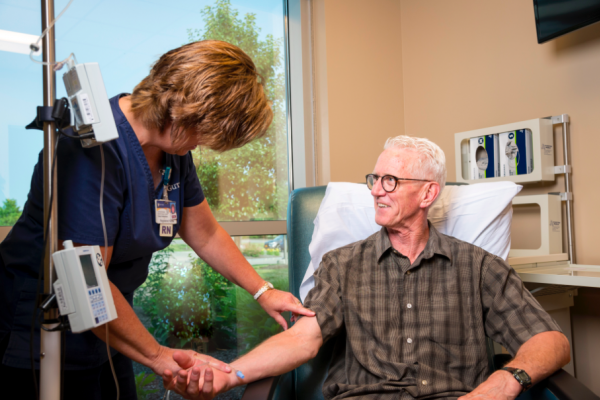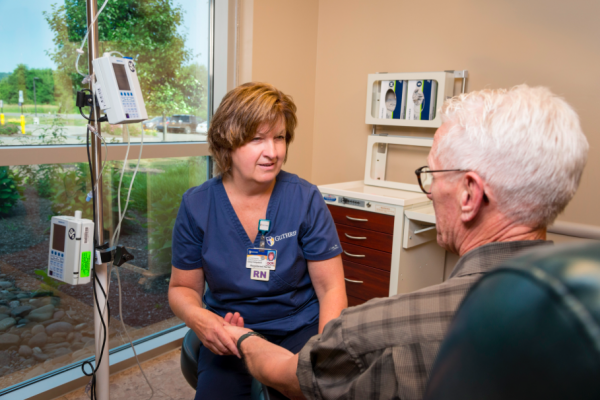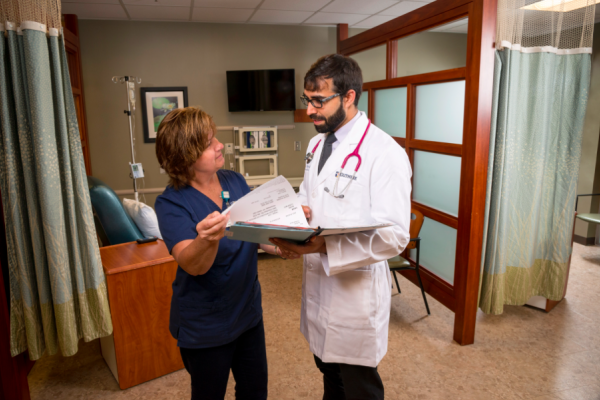What are Leukemia and Lymphoma?
Leukemia and Lymphoma are both cancers that are not associated with a tumor. Lymphomas are cancers that affect the lymph system and start in cells called lymphocytes. Leukemia is a cancer of the early blood-forming tissues, including your bone marrow and lymph system.
There are two main types of Lymphoma:
Hodgkin Lymphoma is cancer that starts in the B lymphocytes (B cells) of the lymph system. Your lymph system helps you fight infection and control the fluids in your body. The disease often starts in the lymph nodes in the upper part of the body and spreads from node to node.
Non-Hodgkin Lymphoma (NHL) is cancer that starts in the lymphocytes anywhere lymph tissue is found: lymph nodes, spleen, bone marrow, thymus, adenoids and tonsils, or the digestive tract. There are many types of lymphoma. Some grow and spread slowly and some are more aggressive. Talk with your doctor about what type you have.
Leukemia typically involves white blood cells, the cells that are your infection fighters. Leukemia can be divided into categories: fast growing (acute) and slow growing (chronic); and by which white blood cells are affected.
- Acute lymphocytic leukemia (ALL) is the most common type of leukemia in young children and can also occur in adults.
- Acute myelogenous leukemia (AML) is a common type of acute leukemia, more common in adults but can occur in children as well.
- Chronic lymphocytic leukemia (CLL) is the most common chronic adult leukemia, you may feel well for years without needing treatment.
- Chronic myelogenous leukemia (CML) mainly affects adults. A person with CML may have few or no symptoms for months or years before entering a phase in which the leukemia cells grow more quickly.
There are other, rarer types of leukemia, including hairy cell leukemia, myelodysplastic syndromes and myeloproliferative disorders.
Screening for Leukemia or Lymphoma
A screening test is used to detect cancers in people who may be at higher risk for developing the disease. With leukemia and lymphoma, there are no early detection tests. The best way to find them is to be aware of the symptoms.
- Swollen lymph nodes which can appear as a lump in the neck, armpit or groin
- Fever
- Night sweats
- Weight loss without trying
- Fatigue
Leukemia can have similar symptoms but also can include:
- Easy bleeding or bruising
- Recurring nosebleeds
- Bone pain or tenderness
If you have one or a combination of these symptoms, it may not be cancer. Talk with your primary care provider about your concerns as well as your risk factors for developing the disease.
Leukemia and Lymphoma Diagnosis
You may visit your doctor because you haven’t been feeling well, have a lump in the neck, armpit or groin or you may have symptoms. Your doctor does a physical exam as well as a health history. He or she may order a blood test or prescribe antibiotics to rule out infection or other causes.
The doctor may also need to get a biopsy of a swollen lymph node or other affected area.
You may be referred to a hematologist, a doctor who specializes in diseases of the blood.
Leukemia and Lymphoma Treatment
Treatment of Lymphoma and Leukemia is complex. You, your primary care doctor and your hematologist/oncologist develop the best care plan for you and your disease.
Typically, the main treatment for both diseases is chemotherapy. Sometimes a treatment plan can include targeted therapy drugs, radiation therapy or surgery.
Lymphoma and Leukemia Care at Guthrie
- Board-certified hematologist/oncologists– your team of doctors includes specially trained hematologist/oncologists who use standard therapies as well as the newest protocols for treating lymphoma and leukemia.
- Multidisciplinary conference – doctors and providers from across specialties discuss every patient and organize the best treatment for her or him across the system
- Nurse navigator and social worker – cancer nurse navigators help you understand your diagnosis and guide you through the health system; social workers provide emotional support and practical support.
- On-site lab for chemotherapy: chemotherapy drugs are mixed on-site for you at all locations so you won’t experience delays in treatment at your appointments.
- Infusion services: Guthrie has four locations for infusion treatment across the region: Corning and Cortland, N.Y.; Sayre and Wellsboro, Pa. You can find a location close to you.
- Clinical trials – Guthrie Clinical Research offers you treatment options not available in most hospitals.




